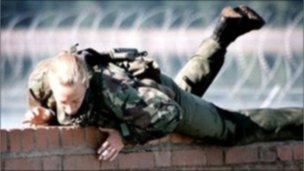Gove puts focus on traditional school values
- Published
Michael Gove: "We need to learn from those countries that outperform us educationally"
The government signalled a return to traditional educational values as it set out wide-ranging plans for school reforms in England.
Education Secretary Michael Gove said heads would get more powers over discipline and that teacher training would be shaken up.
Schools would be backed in introducing blazer and tie uniforms, and traditional prefect and house systems.
The reforms would make England the world's top education nation, he added.
But shadow education secretary Andy Burnham warned the plans would lead to a two-tier system.
Detailing the plans in his White Paper, external to parliament, Mr Gove said England's education system had "lost its way" under Labour and had slipped down the rankings against its international competitors.
But under the coalition government the country would become an "aspiration nation" once again, he said.
His schools White Paper, entitled The Importance of Teaching, sets out plans to reform and improve the quality of teacher training.
But it also emphasises traditional educational values with marks to be allotted for good grammar and spelling in GCSEs, and pupils to be encouraged to study more rigorous subjects.
Mr Gove said there had been an alarming decline in the number of pupils taking these in recent years.
On teacher training, he said new teaching schools, on the model of teaching hospitals, would be set up as "showcases" for good teaching. This would allow for more on the job training.
He said: "There is no profession more noble, no calling more vital, no vocation more admirable than teaching, and this White Paper gives us the opportunity to become the world's leading education nation."
Would-be teachers would face an aptitude test to assess their suitability for the job and the number of high quality graduates becoming teachers would be doubled, he said.
Teachers would be freed up through a radical reduction in the size of the obligatory part of the national curriculum.
'Disruptive pupils'
There will be further efforts to persuade people who have had successful careers elsewhere to go into teaching through a version of the current Teachfirst scheme, to be called Teachnext.
And science and maths graduates who become teachers will have their training fees subsidised, as would ex-servicemen.
Ministers hope the presence of former solders, sailors and airmen in the classroom will help instil school discipline along with other measures to enforce school rules.
Mr Gove said: "Unless order is maintained in the classroom, teachers cannot teach and children cannot learn."
This includes honouring a long-standing promise to give head teachers the ultimate say over who they can permanently exclude from schools.
"We will make it easier for schools to exclude disruptive children without the fear of seeing excluded children reinstated over their heads," he said.
But heads would have to ensure that there was suitable provision available for them elsewhere and fund it.
Struggling schools
He also confirmed plans to give teachers anonymity when facing allegations of wrongdoing and remove the need for 24 hours notice to be given ahead of detentions.
A new benchmark for school achievement under what will be called an English baccalaureate is being set.
This means pupils will be encouraged to take GCSEs in English, maths, a science, a modern language and a humanities subject.
He believes too many schools opt for softer subjects in a bid to boost their league table positions.
Mr Gove said: "I don't think that we should say to children just because they come from a certain background that they shouldn't expect to have any understanding of this country's history or learn a foreign language."
And there will be higher baseline targets for underachievement.
'Vicious assault'
Schools will be considered to be "underperforming" if fewer than 35% of pupils achieve five good GCSEs (those graded A* to C).
Currently, the level is 30% and, based on 2009 data, the change would mean 439 schools would be classed as underperforming.
Mr Gove has already announced extra funding to allow struggling schools to be taken over by successful heads.
He has also warned that he is ready to use powers enshrined in the Academies Act passed this summer to force such schools to become academies under new management.
However, those below the standard but "making good progress" would get leeway.

Ministers hope ex-soldiers will be able to inspire in the classroom
But Labour warned that he risked creating a "two-tier education system" where the requirements of academic pupils are put ahead of those wanting to pursue more vocational courses.
Shadow education secretary Andy Burnham told Mr Gove: "You will need to work hard to explain how your plan won't create a new generation of failing schools."
He added: "Just because he believes in the teaching of history doesn't mean he has to live in the past."
General secretary of the NASUWT teaching union Chris Keates said Mr Gove's plans were a "vicious assault" on teachers' commitment and professionalism.
Association of Teachers and Lecturers head Dr Mary Bousted said it supported the drive for improvement but said Mr Gove's "one-size fits all approach" failed to recognise the diversity of issues facing schools where fewer than 35% of pupils do not get five good GCSEs.
The National Union of Teachers warned the expansion of the academies and free schools programme was a wrong move that would a two tier education system.
General secretary Christine Blower said: "The critical job for schools is to teach children, not to train teachers. What is needed is a two-year higher education-based course, combining both theory and practice, to ensure we have the best trained teachers possible."
Head of the National Association of Head Teachers Russell Hobby said schools could always use greater freedoms, but that the system of accountability dominated the way any freedoms were used.
- Published24 November 2010
- Published24 November 2010
- Published22 November 2010
- Published22 November 2010